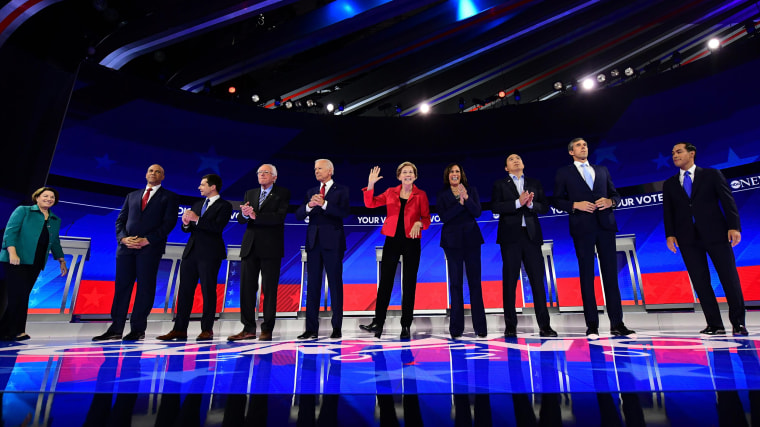WASHINGTON — The Democratic National Committee is raising the qualification threshold for the November presidential debate, but the jump is less steep than previous increases.
To qualify, candidates will need to hit 3 percent support in at least four early state or national polls that meet the DNC’s methodological requirements, up from 2 percent for the September and October debates.
The number of unique online donors needed to qualify will climb to 165,000, up from 130,000 for the previous two debates.
That's smaller than the jump from the debates this summer to the early fall, when the polling and donor thresholds doubled. The new criteria will most likely winnow the debate stage, though it's unclear by how much.
Candidates will once again need to hit both the polling and grassroots donor threshold.
But there will be a new option for candidates to meet the polling threshold: They can now check that box by getting at least 5 percent in two polls of early states — Iowa, New Hampshire, Nevada, and South Carolina — instead of 3 percent in four polls.
According to an NBC News analysis, 11 candidates appear to have qualified so far for the October debate in Ohio using the previous threshold: former Vice President Joe Biden; Massachusetts Sen. Elizabeth Warren; Vermont independent Sen. Bernie Sanders; California Sen. Kamala Harris; Mayor Pete Buttigieg of South Bend, Indiana; New Jersey Sen. Cory Booker; Minnesota Sen. Amy Klobuchar; former Housing Secretary Julián Castro; former Texas Rep. Beto O'Rourke; entrepreneur Andrew Yang; and billionaire Tom Steyer.
Hawaii Rep. Tulsi Gabbard needs just one more poll to qualify.
With 11 or 12 candidates on stage, the October debate could go back to be two nights, after the last debate shrunk to just one when only 10 candidates had qualified. The debate, hosted by CNN and The New York Times, is scheduled for Oct. 15 and potentially 16.
The dates, location and media sponsors for the November debate have yet to be announced.
So far, there have only been three qualifying polls released since the start of the November debate's polling window, Sept. 13.
But Biden, Harris, Warren, Sanders and Buttigieg appear to be locks for the November stage— they're well above the unique donor threshold and have hit at least 3 percent in virtually every DNC qualifying poll since July 1.
O'Rourke's campaign has the donors and one qualifying poll right now. But his trajectory in recent polls also puts him in solid shape to qualify.
The odds are a murkier for the rest of the field.
Booker already has two qualifying polls of at least 3 percent, and his campaign recently began an aggressive fundraising push. But his campaign manager sounded alarms over the weekend, saying in a memo that, "Without a fundraising surge to close out this quarter, we do not see a legitimate long-term path forward."
Yang only hit 3 percent in one of the three qualifying polls, though he had previously hit that mark in five polls over the past six weeks. Klobuchar has only hit the three percent threshold twice since Aug. 1, once since the start of the November window. Both Castro and Steyer have only hit that 3 percent threshold once since July.
Gabbard has never hit 3 percent in a qualifying poll.
It also seems highly unlikely any of the lowest-polling candidates— including self-help author Marianne Williamson, Montana Gov. Steve Bullock, Colorado Sen. Michael Bennet, former Maryland Rep. John Delaney, and Ohio Rep. Tim Ryan— will qualify.


